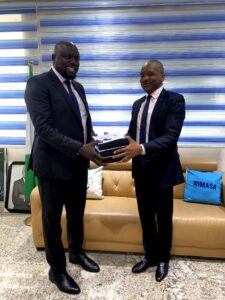The Maritime Security Providers’ Association of Nigeria (MASPAN) has tasked the Nigerian Maritime Administration and Safety Agency (NIMASA) to change its approach in the procedure to how piracy issues are resolved and how the Gulf of Guinea will be better secured against piracy.

The MASPAN, which is a body of professional in maritime security gave the advice during its recent visit to the management of NIMASA.
The group which was led by its President; Mr Emmanuel Maiguwa told the management of NIMASA that the recent incident involving the crude oil tanker MT HEROIC IDUN, calls for a review of the existing Best Management Practices (BMP) which were meant to deter piracy and enhance maritime security off the Coast of West Africa and the Gulf of Guinea in general.
The BMP helps companies and mariners to risk-assess voyages and mitigate external threats to their safety while operating in and around the coast of West Africa, including the Gulf of Guinea.
Recall that the Nigerian Navy recently confirmed the arrest of MV HEROIC IDUN, a supertanker, by Equatorial Guinea forces over alleged crude oil theft in Nigeria.
The arrest of the tanker by the Central African country came after it fled from Nigeria’s Akpo oilfield when its activities were uncovered by operatives of the Nigerian Navy.
The Navy had also confirmed that the supertanker with International Maritime Organisation (IMO) number 9858058 raised a false alarm that it was under pirates’ attack when ‘NNS GONGOLA’ ordered the vessel to sail to Bonny Fairway Buoy for interrogation.
But, MASPAN argued that the circumstance surrounding the escape and subsequent arrest of the oil tanker called for a review of existing Best Management Practices.
According to the group, “following the incident of MT HEROIC IDUN, it is evident that there is an urgent need for NIMASA to spearhead the review of the provisions of BMP West Africa”.
It noted that, the way the BMP is at the moment, it gives no preference to reports emanating from nation’s where piracy occurs.
Arguing further, MASPAN said, “as currently constituted, the document does not give priority in reporting line to the country of the jurisdiction where incidences occur”.
Narrowing down to the MT HEROIC IDUN case, the maritime security providers said “as a result, the vessel gave a false report to the M-DAD GoG before Nigerian authorities could vet the information”.
They pointed out that, had the Nigerian Navy not been directly involved in raising an alarm and tracking the tanker, the false claim that MT HEROIC IDUN sent to global maritime piracy reporting agencies would have been tagged as piracy.
Read Also: Patrol Team Intercepts Smuggled Rice On Badagry Waterways
Making reference to Nigeria’s clean record of piracy so far, MASPAN noted that, “had this incident not involved the NN, it would be difficult to counter IMBs report, and a false report would have erased our clean sheet”.
“The most appropriate procedure should have been for the vessel under attack in our water to call NIMASA/NN as first responders before other agencies, in line with the standard security protocol enshrined in ISPS Code, in the interest of Nigeria and GoG”, it stated
“Essentially, there is a need to review the protocols for reporting incidents and other concerns identified in BMP West Africa document”, it stressed.
The MASPAN also told NIMASA that there is need for maritime seminars to sensitize key maritime industry stakeholders on the provisions of the Suppression of Piracy and Other Maritime Offenses (SPOMO) ACT as is being done with Judges.
According the group, “while the programme for the Judiciary will support the Judges in the dispensation of Justice, consistently having the same for stakeholders will enhance compliance and ease of business. In addition, these seminars will provide NIMASA with gaps for future enforcement and future review of the Act”.
Kindly like us on Facebook/twitter














